On December 17, Canada announced new Clean Electricity Regulations aimed at achieving a net-zero electricity grid by 2050. This is a slower approach than the previous goal to have an emissions-neutral grid by 2035. Some provinces and energy companies expressed concerns that the draft rules might make electricity less reliable and more expensive.
Canada already gets 85% of its electricity from clean sources like hydropower, wind, and solar power. However, the new, less strict regulations might make it tougher for the country to meet its 2035 goal of reducing carbon emissions by 45–50% compared to 2005 levels.
Jonathan Wilkinson, Canada’s Natural Resources Minister, explained, “We haven’t lowered our aims for cleaning the grid, but we’ve learned that we need to be flexible. We want to reduce emissions while also ensuring the grid remains reliable and affordable for everyone.”
The final regulations are set to reduce carbon emissions from the electricity grid by almost 181 megatonnes from 2024 to 2050. In contrast, the draft regulations had aimed for a reduction of 342 megatonnes. Also, the limit on emissions from power plants was raised from 30 tonnes to 65 tonnes of carbon per gigawatt-hour.
Power plants that make electricity but do not connect to the grid, including some run by oil sands companies in northern Alberta, will not be affected by these regulations. Alberta, Canada’s main oil and gas-producing province, opposed the initial draft regulations, saying they could threaten grid reliability.
Tag: all
-

Canada’s Clean Electricity Regulations: Striving for a Greener Tomorrow
-
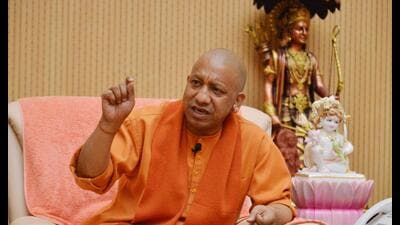
UP Government Hires 700,000: Unemployment Drops to 2.4%!
Over the past 7.5 years, the UP government has hired around 700,000 people in different departments. Chief Minister Yogi Adityanath announced that the unemployment rate in Uttar Pradesh has dropped significantly from 19% in the past (2012-2017) to just 2.4% now. He criticized the Samajwadi Party for delaying hiring when they were in charge, claiming it was due to their bad intentions.
Adityanath assured that the hiring process was transparent and followed reservation rules strictly, making it fair for all. He encouraged opposition members to understand and apply the government’s youth-friendly policies in their areas.
He also highlighted the issues before 2017, mentioning that many posts were filled unfairly, often benefiting people from the same caste. Additionally, he pointed out that a poorly qualified person had once been appointed as the chairman of the commission responsible for hiring, which harmed the youth’s future.
To improve things, Adityanath said the government has made reforms to make the hiring process honest and fair. They have given full authority to the public service commission, subordinate service selection commission, and education commission to conduct recruitment. Members of the cabinet actively participate in handing out job offer letters, ensuring there’s no favoritism.
In the education sector alone, the government has completed over 160,000 recruitments. A new board called the Uttar Pradesh Education Service Selection Commission has been set up to manage hiring in all education areas. The government also passed a law to prevent cheating in exams.
Recently, they hired 69,000 teachers, ensuring that many qualified candidates from backward castes and Scheduled Castes got jobs. For example, over 32,200 people from backward castes and over 14,000 from Scheduled Castes were employed.
In total, 156,000 police personnel were hired, with more than 22,700 being women. The hiring process for an additional 60,244 police positions is ongoing. -
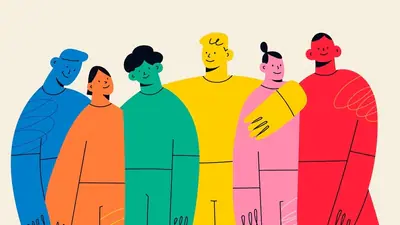
Record Low Drug Use Among Teens: New Survey Findings Revealed!
A recent survey has found that drug and alcohol use among teenagers hasn’t gone back up after it dropped during the COVID-19 pandemic. This year, two-thirds of 12th graders reported they hadn’t used alcohol, marijuana, cigarettes, or e-cigarettes in the last 30 days. This is the highest number of kids staying away from these substances since the survey began in 2017. Among 10th graders, 80% reported similar abstinence, marking another new high. For 8th graders, 90% said they hadn’t used any of these substances, which is the same number as last year.
The only noticeable increase was in the use of nicotine pouches. About 6% of 12th graders said they used them in the past year, up from 3% in 2023. Experts are unsure if this indicates a new health issue. Richard Miech from the University of Michigan, who leads the survey, mentioned, “It’s hard to know if we’re seeing the start of something, or not.”
The Monitoring the Future survey has been collecting data since 1975. This year’s results come from about 24,000 students in grades 8, 10, and 12 across the U.S. Experts, like Noah Kreski from Columbia University, consider this survey one of the best sources for national data on teen substance use.
During the pandemic, kids were told not to go to school or hang out with friends. They stayed home and were supervised by their parents. This led to a drop in all kinds of drug and alcohol use since young people usually experiment with substances in group settings. As lockdowns ended, many expected some kids to start using again, but that hasn’t happened.
Even before the pandemic, teen use of cigarettes, alcohol, and many drugs was already declining. Experts think that kids started using smartphones to communicate instead of gathering in groups, which kept them away from experimenting with drugs. Marijuana use wasn’t falling before the pandemic, and kids had started vaping more. But during the pandemic, both saw a continued decline.
Some experts believe the pandemic may have had a bigger impact. Miech noted that many teens who start trying e-cigarettes or drugs do so in the 9th grade. However, the kids who were in 9th grade during the lockdowns didn’t try those substances and weren’t able to influence younger students negatively. “The pandemic stopped the cycle of new kids coming in and being recruited to drug use,” he said.
Mental health may also play a role. After the pandemic, many kids reported feeling depressed and anxious. While depression can lead to substance use, some teens with anxiety are cautious about using drugs. Dr. Duncan Clark, a psychiatrist at the University of Pittsburgh, says, “Some teens with anxiety worry about substances. Additionally, they may be more socially shy and have fewer chances to use drugs. It’s a complicated relationship.” -
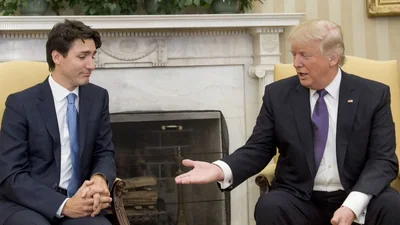
Trump Mocks Trudeau After Freeland’s Shocking Resignation
Donald Trump made fun of Justin Trudeau on Truth Social after the surprising resignation of Canadian Finance Minister Chrystia Freeland. Trump called Trudeau “governor,” poking at a previous joke about the U.S. taking over Canada. He said, “The Great State of Canada is shocked that the Finance Minister resigned or was fired by Governor Justin Trudeau.”
Trump then slammed Freeland, calling her “toxic” and said that her leaving was good for Canada. He wrote, “Her behavior was totally toxic and not good for making deals that the unhappy people of Canada need. She will not be missed!!!”
Freeland shared her resignation letter on social media, explaining that Trudeau no longer wanted her as Finance Minister and offered her another position instead. She decided that the best thing to do was resign.
Freeland’s sudden exit was a big deal for Trudeau, as many Canadian leaders are now calling for him to step down. Bloc Quebecois Leader Yves-François Blanchet said, “Mr. Trudeau’s government is over. He must acknowledge this and take action.” Freeland also mentioned that she and Trudeau disagreed on the best way forward for Canada. -
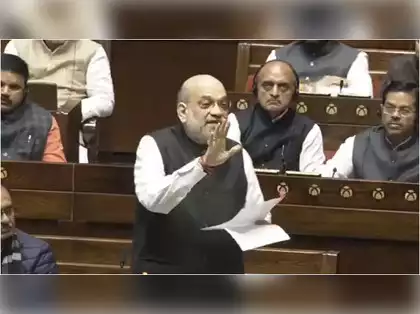
Amit Shah’s Strong Message: BJP’s Achievements vs. Congress’s History
Home Minister Amit Shah strongly criticized the Opposition in a recent Rajya Sabha debate about India’s Constitution. He accused the Congress party of pleasing minorities, being corrupt, and favoring family rule. He claimed that past Congress-led governments adjusted the Constitution for their own benefit.
Shah expressed his party’s commitment to the Hindutva ideology, promising to implement the Uniform Civil Code nationwide. He also mentioned big projects like the Ram Temple in Ayodhya and the Kashi Vishwanath corridor.
In his speech, Shah pointed out that there have been 22 amendments to the Constitution under BJP rule, compared to 77 amendments under Congress. He recalled historical amendments that he said restricted citizens’ freedoms, like those made during Indira Gandhi’s time. He mentioned how the 42nd amendment even limited judicial review, allowing Parliament to change Fundamental Rights.
Shah defended the BJP’s constitutional changes, saying these amendments help strengthen democracy, such as introducing the Goods and Services Tax and reserving seats for women in government.
He attacked the Congress for its history of dynasty politics and its inconsistencies, accusing it of pretending to support reservations for certain groups while opposing them in the past. He asserted that the BJP will not allow religious reservations in the states where it holds power.
Shah also pushed for the Uniform Civil Code, questioning why only some laws for Muslims are being implemented and suggesting that all personal laws should be considered.
In his closing remarks, he highlighted achievements of the Modi government, like building the Ram temple and abrogating Article 370, while also defending Veer Savarkar and citing how Indira Gandhi praised him.
-

Two Men Shot in Imphal East: Police Investigate Violent Attack”
Late in the evening, two men were shot in their legs by unknown attackers in Imphal East. This incident happened around 7 PM in a place called Khundrakpam, which is near the Heingang Police Station.
The injured men are from two different areas: one lives in Sagolband and the other in Sekta. The assailants came with guns and aimed for their legs before running away.
Local people who saw what happened quickly helped the two men. They were taken to the Imphal East District Police, who made sure they got medical care. Later, both victims were sent to a hospital in Imphal for further treatment.
Authorities are looking into what happened but still do not know who the attackers are or why they did this. Heingang Police Station has started a search in the area to find more information and catch those responsible for this terrible act.
-

Army and Police Team Up to Find Bombs, Save Lives in Manipur
The Indian Army and Manipur Police acted quickly when they got tips about explosives near Maphitel Ridge in Imphal East district. They worked together and found five bombs, called IEDs (Improvised Explosive Devices), weighing a total of 21.5 kilograms at different spots.
A special dog named Eva, trained to smell explosives, and the Army’s Bomb Disposal Squad played a big part in finding these bombs. By recovering these IEDs, they stopped a potential danger and saved many innocent lives. This operation shows how well the Army and local police work together to keep Manipur safe. They are dedicated to stopping harmful activities in the area and keeping everyone safe.
-

India and Indonesia Strengthen Defence Ties: A New Era of Collaboration
Indonesia is excited to work with India on defense technology. Navy Chief Admiral Dinesh K Tripathi met with top military leaders in Indonesia to talk about how both countries can strengthen their military ties. During a recent meeting, Admiral Tripathi and Indonesia’s Defense Minister, Sjafrie Sjamsoeddin, focused on how they can work together on defense technologies, joint military exercises, and training.
Admiral Tripathi explained that India is developing its own technologies to improve its Navy, which impressed Minister Sjamsoeddin. He shared his eagerness to work with India to enhance Indonesia’s defense capabilities.
The discussions also covered ways to improve cooperation at sea, highlighting potential joint training and operational activities. Admiral Tripathi’s visit shows how strong the relationship is between India and Indonesia, especially in the Indo-Pacific region. Indonesia is an important part of ASEAN, a group of ten Southeast Asian countries. Both nations believe their relationship is growing but see lots of chances to make it even better.
-

Ronaldo Aims to Become CBF President and Revitalize Brazilian Football
Brazilian football legend Ronaldo has shared his big dream: he wants to be the president of Brazil’s football governing body, the CBF. He believes the sport is in trouble and wants to fix it.
In a recent interview, Ronaldo said, “I have many reasons to run, but the biggest one is to bring back respect for Brazilian football.” He plans to be a strong leader and make significant changes to help the national team, known as “the Selecao,” regain its glory as five-time world champions. He remembers scoring twice when Brazil won the 2002 World Cup against Germany and wants to inspire the current players to see the proud history of wearing the national jersey.
For Ronaldo to run for the CBF presidency, he needs support from local football clubs. He is ready to travel across Brazil to share his exciting ideas for improving football in the country. The next CBF election will happen between March 2025 and March 2026.
Currently, the CBF chief, Ednaldo Rodrigues, is facing criticism for how he has managed the national team. Ronaldo believes the issue goes beyond just one person. “My goal is to get people excited about the Selecao again. Right now, many fans feel indifferent when the team plays,” he said.
Ronaldo has also managed football clubs before. He bought majority control of Real Valladolid in Spain in 2018 and Cruzeiro, his first team in Brazil, in 2021. He sold his stake in Cruzeiro earlier this year. Now, Ronaldo is in talks to sell his share in Valladolid so nothing will stop him from running for CBF president.
-
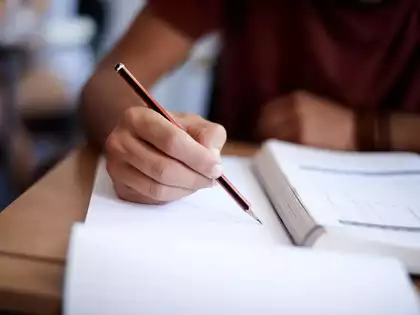
Exciting New Changes in India’s Exam System with DIGI-EXAM!
The government has made new suggestions to improve exams in India. A special group, led by former ISRO chief R. Radhakrishnan, released a report recommending a DIGI-EXAM system. This system aims to stop cheating, ensure secure testing centers, and provide exams in a fair way for everyone.
Here are some main points from the report:
Change to Computer Tests: The report says it’s important to change from paper exams to computer-based tests (CBT). This change will help make the process smoother, but there could be challenges in remote areas where internet and facilities might be lacking.
DIGI-EXAM Technology: The DIGI-EXAM system will use advanced technology to confirm the identity of students through methods like Aadhar (an ID system in India), biometrics (like fingerprints), and AI (smart technology). This will make sure that the right person is taking the exam.
Improving the Testing Agency: The National Testing Agency (NTA) currently manages many tests, but it needs more focus. The panel suggested creating ten new divisions, each led by a director, to handle different parts of the exam process like technology and security.
New Exam Centers: The report suggests creating at least 1,000 secure testing centers in government schools and colleges. This would help students take exams closer to home. It also mentions using buses as mobile testing centers for rural areas, where students may not have easy access to regular test centers.
Multiple Sessions for Big Exams: For very popular exams where a lot of students register (like the NEET-UG), the report recommends holding tests over several days to manage the number of candidates more effectively.
Future Goals: The panel wants to make exams more straightforward and uniform, so students don’t face confusion. It also calls for a single set of rules for undergraduate admissions to simplify the process for everyone.
Overall, this new approach aims to make exams fairer, more secure, and easier for students across India.
